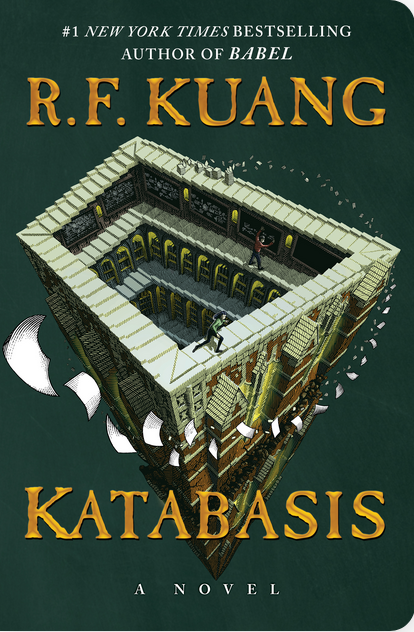Naslov knjige: Katabasis
Autor knjige: R.F. Kuang

Autor recenzije: [email protected] - 26.09.2025
Fantasy Dark Academia Fiction Romance
While I entered Katabasis with high expectations, anticipating a thrilling descent into a magical underworld, I found myself navigating a narrative that, while undeniably ambitious, occasionally lost its footing. R.F. Kuang's premise, a postgraduate in analytic magick, Alice Law, and her fellow Peter Murdoch embarking on a perilous journey through the eight courts of Hell to retrieve Professor Jacob Grims, held immense promise. The initial setup, the chalk-drawn pentagram, and the evocative descriptions of the oppressive weather and the chilling architecture of Hell, painting a vivid and compelling tableau. However, the immersive atmosphere was frequently obscured by an overabundance of descriptive detail. Kuang's prose, while often beautiful, became a dense fog, making it difficult to maintain focus and follow the narrative's thread. The emphasis on Peter Murdoch's backstory, while intriguing, often overshadowed Alice Law's journey in the first helf of the book , leaving her character somewhat underdeveloped. Peter, the aloof yet seemingly empathetic magician, held the reader at arm's length, creating an emotional disconnect that I found frustrating. Alice's attempts to bridge this gap, to truly understand him, were compelling, but often felt thwarted by the narrative's focus on Peter's internal landscape ,It is worth noting that Alice does take a pivotal role in the final chapters, demonstrating her agency and importance within the story. The enemies-to-lovers trope, a point of significant interest, delivered moments of both captivating tension and jarring incongruity. Certain twists were genuinely unpredictable, eliciting a visceral shock that propelled me forward. However, the initial motivation for the descent into Hell remained shrouded in a perplexing ambiguity, leaving me feeling disoriented rather than intrigued. Kuang's integration of philosophical and mathematical concepts, while intellectually stimulating, often felt like a display of academic prowess rather than a seamless narrative element. The author's rapid-fire exposition, jumping between complex ideas without sufficient contextualization, left me feeling intellectually inadequate. While a good book should challenge the reader, Katabasis occasionally veered into didacticism, creating a sense of distance rather than engagement. In conclusion, Katabasis is a work of undeniable ambition and intellectual depth. Kuang's ability to craft a dark and atmospheric world, including the detailed building and oppressive weather, is evident, and the narrative's unexpected twists are genuinely compelling. However, the overreliance on dense description, the uneven pacing, and the occasional feeling of being talked down to ultimately prevented me from fully immersing myself in the story. While I commend Kuang's willingness to tackle complex themes and push the boundaries of genre, I ultimately felt that the narrative's potential was not fully realized. I would recommend this book to readers who appreciate intellectually challenging fantasy and are willing to navigate a dense and sometimes perplexing narrative, but with the caveat that it demands patience and a willingness to grapple with its complexities.